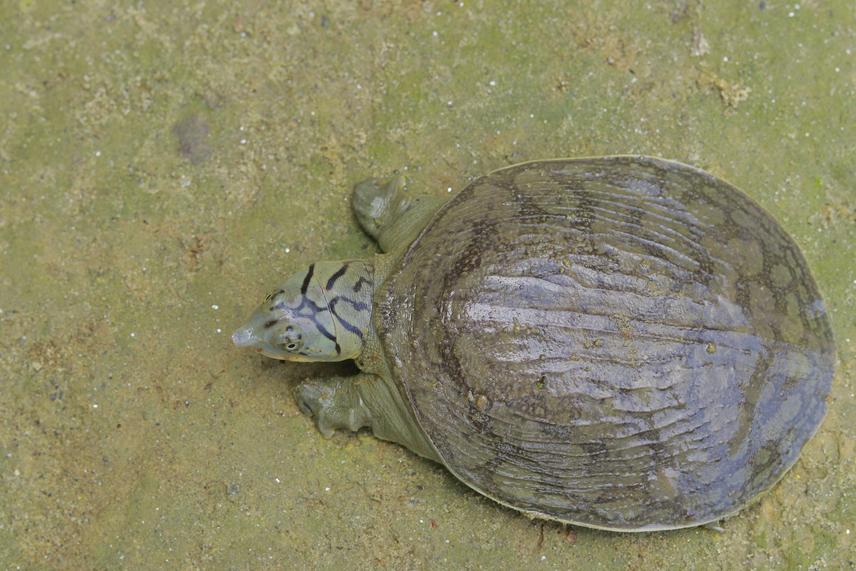Sumana Chhetri
Narayani River in Central Nepal flows through Chitwan National Park, providing critical habitat for several aquatic fauna including four globally threatened softshell turtles: the Indian Narrow-headed Softshell Turtle, Indian Peacock Softshell Turtle, Indian Softshell Turtle, and Indian Flapshell Turtle. Indigenous communities (Tharu, Bote, Majhi, Musahar, and Magar) residing near the Narayani River are primarily forest/wetland-dependent subsistence farmers and fishermen. Due to a lack of community awareness, turtles are often caught as bycatch during fishing or in accidental encounters and later consumed or sold as pets. Other threats include aquatic habitat degradation through illegal sand mining, heavy pesticide use and industrial pollution, overfishing, invasive species infestation, and climate change.

Indian softshell turtle (Nilssonia gangetica). © Sumana Chhetri.
Industrial areas of Hetauda and Nawalparasi are discharging minimally treated wastewater into the Narayani and tributaries. Climate change causes heavy rainfall and flash floods that wash away turtle nesting and basking sites while drying tributaries during prolonged dry seasons. Online pet trade is a recent phenomenon, further exacerbating the situation.
Despite this, the conservation focus of key stakeholders like Chitwan National Park, Divisional Forest Office, and concerned organisations are lacking, as softshell turtles are not among flagship species used in fundraising for conservation. Anecdotal evidence suggests that turtle sightings in recent years have declined. However, there is no science-backed data to prove this as softshell turtles are poorly studied. To date, there are no conservation management plans and monitoring for the species. They are not among the "Protected" species list under the National Park and Wildlife Conservation Act of Nepal.
This project is designed to bring conservation attention to softshell turtles. To achieve this:
1. We will conduct a systematic ecological survey for distribution, occupancy, and threat assessments in the Narayani River, and a social survey for consumption and trade assessment in associated buffer zone communities.
2. We will provide a detailed report to Chitwan National Park, buffer zone community forests, and all concerned agencies with tailored recommendations to promote turtle-friendly management plans.
3. We will conduct community-level capacity-building training to empower buffer zone community forest user groups, national park staff, park security personnel, and community leaders on softshell turtle monitoring skills, threat identification, turtle-friendly conservation planning, and aquatic habitat management.
4. We will conduct awareness campaigns targeting fishing communities and secondary-level school students on the conservation importance of softshell turtles, with the aim of reducing their consumption and trade.
Overall, this project will lay a strong foundation for sustainable and impactful conservation measures for softshell turtles in the project site.